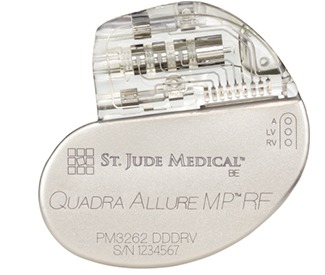
St Jude Medical has received US Food and Drug Administration approval for its MultiPoint pacing technology. This technology is designed to provide additional options which may benefit cardiac resynchronisation therapy patients who are not responsive to other methods of pacing.
MultiPoint Pacing technology is designed to allow physicians to capture more left ventricular tissue quickly by delivering pacing pulses to multiple left ventricle locations rather than the traditional single pulse for each heartbeat. Using the Quartet left ventricular (LV) lead physicians should have the capability to program two pulses from a single lead and tailor them to the specific needs of each patient.
“Having the ability to truly individualise cardiac resynchronisation therapy is a significant step forward in the clinical approach to treating some of our most complex heart failure patients,” says Gery Tomassoni, director of electrophysiology at Baptist Health Lexington in Lexington, Kentucky. “MultiPoint Pacing technology provides a new set of tools that can be non-invasively programmed in an attempt to improve CRT response, thus opening up an important new treatment option for many patients who may need it.”
This technology features on the Quadra Assura MP cardiac resynchronisation therapy defibrillator (CRT-D), the Quadra Allure MP CRT-pacemaker (CRT-P) and two new quadripolar Quartet LV ventricular leads.
St Jude Medical has also announced FDA approval of additional quadripolar pacing Quartet LV leads, which can be used with MultiPoint Pacing technology, as well as the programmer-based Auto VectSelect Quartet Test. The two new leads are designed based on the company’s first-to-market, clinically proven Quadripolar LV lead technology and include additional electrode spacing options on two new S-curve shaped lead designs. The expanded family of Quartet LV leads offers more options to effectively meet the needs of patients with larger as well as smaller cardiac anatomies. Physicians can quickly customise therapy using the new automated Auto VectSelect Quartet Test, according to a company release, which is designed to offer comprehensive testing results so appropriate therapy options can be easily and efficiently programmed for each patient in a streamlined workflow.
St Jude Medical developed and launched the industry’s first quadripolar pacing system in the USA in 2011 featuring four pacing electrodes, designed to offer physicians the ability to effectively and efficiently manage the ever-changing needs of patients with heart failure. The Quartet LV lead design is intended to allow the physician to implant the lead in the most stable position without making trade-offs in electrical performance; this has also been demonstrated to reduce the likelihood of costly and invasive lead revision through a second intervention procedure. MultiPoint Pacing technology shifts the treatment options from a single point of pacing to multiple quadripolar pacing offerings that are intended to provide physicians more advanced options to optimise CRT performance.












